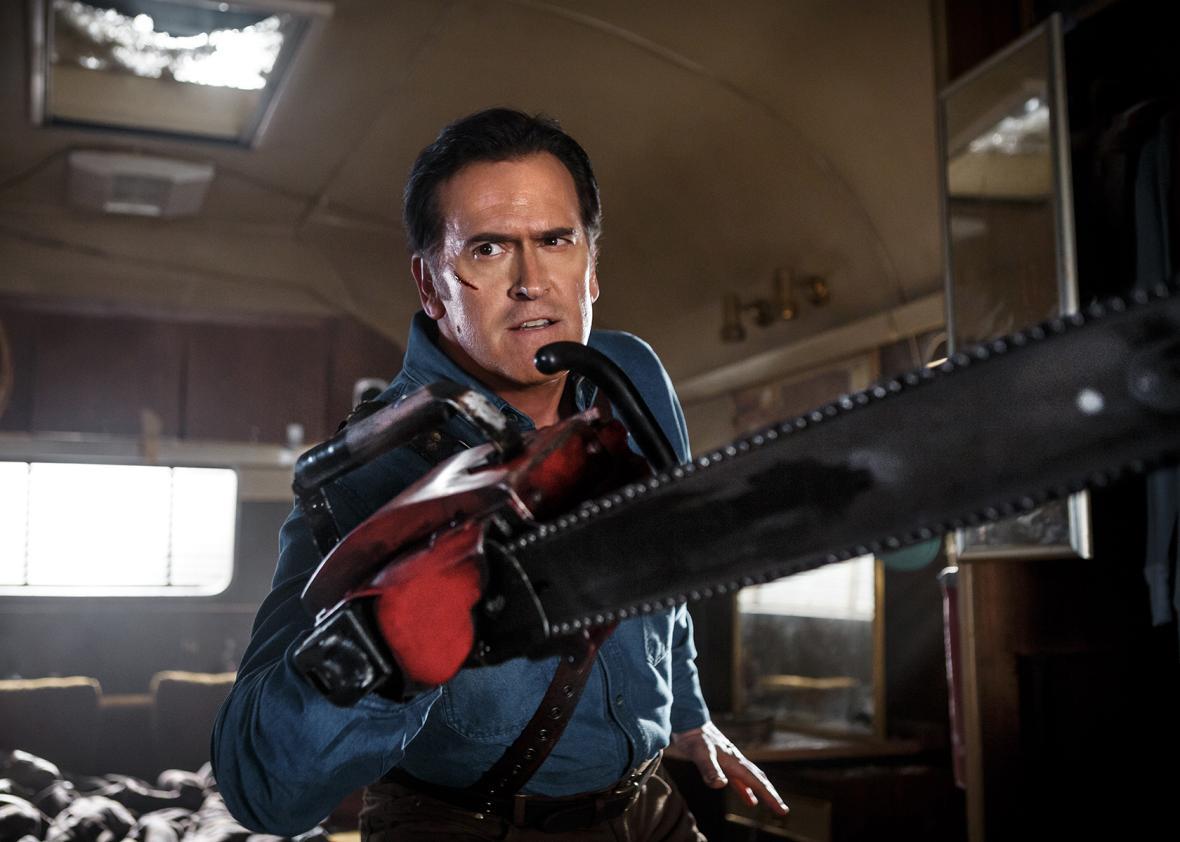Sam Raimi’s Evil Dead franchise is irreverent, gory, and bizarre. There’s no dark existential angst or heavyhanded meta-horror. Instead, it’s all about the hammy magnetism of Bruce Campbell: Bruce Campbell attaching a chainsaw where his hand once was. Bruce Campbell mugging for the camera. Bruce Campbell spewing catchphrases almost as often as his demonic victims spew bodily fluids. And with its cheeky tone, fast pace, charismatic lead, and distinctive atmosphere, this franchise is a perfect fit for TV. Starz’ Ash vs. Evil Dead, which premieres on Halloween, gleefully delivers all of the best characteristics of the franchise in its first two episodes. The pilot, in particular, has Raimi’s fingerprints all over it, because he wrote and directed it.
The show comes on the heels of three Raimi-directed movies (Evil Dead, Evil Dead II, and Army of Darkness) and a 2013 remake directed by Fede Alvarez. Over the three Raimi-directed installments, we watched Ash morph from a relatively quiet lone survivor to a catch-phrase-fueled, rambunctious blowhard of the best kind. Now in Starz’ Ash vs. Evil Dead, we meet Ash in prime form—albeit a little wrinkled and fattened by age. He’s still missing his hand, but now he’s sporting a rosewood prosthetic—which he shows off to a woman in a bar, claiming he lost his hand saving a child from an oncoming train. They’re getting it on in the bathroom moments later. All is well until her face morphs into something fearsome and her eyes turn white. She’s a deadite—a human possessed by evil spirits. In no time, Ash is back to work hacking his way through possessed neighbors, acquaintances and strangers with a chainsaw and shotgun.
Raimi’s zany sense of humor is on display from the pilot’s outset, as an energetic Ash gets ready for a night out. In classic wordless Raimi fashion, the show pokes fun at its aging protagonist within the first 30 seconds—by displaying his struggle to tighten a leather girdle around his waist. After less than five minutes, he’s met his first deadite in that bar bathroom. But in the blink of an eye, she’s transformed into her old self—long enough for Campbell to finish having sex with her, while making some very funny bewildered faces. Although we soon find out how the dead have awakened for the first time in roughly 30 years, Raimi provides as little explanation of the curse’s actual mechanics as ever. And, of course, soon after we realize the curse has awakened once more, we see one of the traveling POV shots that instantly identify the Evil Dead franchise.
Sure, the blood now looks a little more realistic and the overall production value has been upped. And the length of a TV show requires a little more explanation and hand-holding to keep viewers interested over several hours of material. But Raimi keeps the exposition to a minimum, and the personality dialed to 100 as always. His humor and Campbell’s delivery are synced as ever in the pilot, and superfans will revel in all the callbacks and catchphrases peppered throughout—including a brief catch-up montage that incorporates story elements and footage from previous Evil Dead installments into Ash’s backstory.
But Raimi is not listed as writing or directing any of the nine episodes following the pilot, so it’s hard to say whether the series will continue to live up to its cult classic predecessors. The second episode provides a few typically funny fight scenes and plenty of the usual slapstick laughs, but without Raimi’s quieter humor, the transitions holding these raucous moments together can feel a little generic—some scenes almost feel like a standard procedural, albeit peppered with some supernatural goings-on.
In the pilot, Ash’s boss rages at him, “Look you retard—and I can say ‘retard’ because my gardener is a huge one.” The actor pauses just enough after saying “retard” for all of us to absorb it in surprise—and then he finishes the line, and the joke is on us, because this was a conscious transgression. Like one of those perfectly-timed squirts of blood, the joke is classic Raimi: surprising, queasy-making, and very funny all at once.
